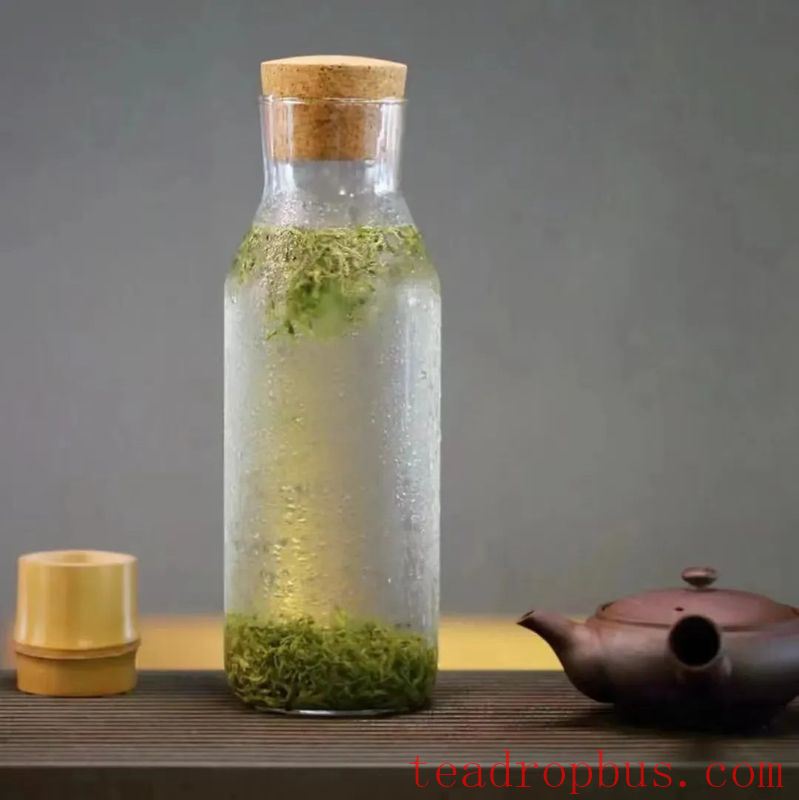As the summer heat intensifies, many tea enthusiasts are less inclined to drink hot tea, and as a result, cold brewed tea has become a refreshing companion for many.
Several scientific studies have confirmed that cold brewing does indeed extract the internal substances from tea leaves. However, due to the lower temperature, there are fewer water-soluble extracts and a slower release rate, which creates a distinct taste compared to hot brewed tea.

What advantages does cold brewed tea offer over hot tea? And where do the misconceptions about cold brewing lie?
Advantages of Cold Brewed Tea
1. Lower Caffeine Content.
The caffeine in tea leaves is more easily dissolved in hot water but is less soluble in cold water. Therefore, cold brewed tea contains relatively lower levels of caffeine, making it an ideal choice for those who are sensitive to caffeine or wish to enjoy a cup of tea in the evening without affecting their sleep.
2. Stronger Antioxidant Activity.
Studies show that teas such as black tea, green tea, White Tea, and Oolong tea, when cold brewed, produce tea infusions with stronger antioxidant activity than those prepared by hot brewing. This means that cold brewed tea has a greater ability to eliminate free radicals in an external environment, which is beneficial for health.

3. Sweeter Taste.
Cold brewed tea has a sweeter taste, primarily because the amino acids that impart sweetness are more likely to dissolve first in cold water, while tannins and caffeine, sources of bitterness, are less likely to be released, reducing the bitterness and enhancing the sweetness of the tea infusion.
4. Convenient and Quick.
Cold brewed tea does not require hot water; simply place the tea leaves in cold water and refrigerate for several hours before drinking. This method of brewing is not only convenient and quick but also well-suited for outdoor activities or situations where hot water is unavailable.
Misconceptions About Cold Brewed Tea
1. Should You Rinse the Tea Leaves Before Cold Brewing?
Those accustomed to rinsing the tea leaves before brewing hot tea might wonder if this step is necessary for cold brewing. Teas suitable for cold brewing are typically tender, like green tea, white tea, and some oolong teas.
These tender leaves contain abundant polyphenols and amino acids, which gradually release into the water during cold brewing, giving the tea infusion a fresh taste and pleasant aroma. In contrast, teas with higher fermentation levels, such as black tea and Pu'er tea, are not ideal for cold brewing because their components release slowly, making it difficult to fully express the characteristics of the tea.

2. Is Chilled Hot-Brewed Tea the Same as Cold Brewed Tea?
Cold brewed tea is defined as using cold water to steep tea leaves, not chilling tea leaves after hot brewing. Chilled hot-brewed tea can only be called “chilled tea,” and although the tea infusion tastes cool, it lacks the freshness and crispness of cold brewed tea.
Therefore, when trying cold brewing, use cold water directly to steep the tea, avoiding the practice of hot brewing followed by chilling.
3. Can You Leave Cold Brewed Tea to Steep Indefinitely?
While cold brewed tea requires longer steeping times to fully release the components in the tea leaves, this does not mean the longer the better.
Extended steeping can lead to an excessive release of bitter components in the tea infusion, resulting in a bitter and unpleasant taste. Generally, for tender leaf teas like green tea or white tea, a steeping time of around 4 to 8 hours is appropriate.
Additionally, to maintain the freshness and taste of the tea infusion, it's best to consume cold brewed tea within 24 hours.

Although cold brewed tea offers multiple benefits, it is not suitable for everyone to consume excessively. Individuals with weak spleen and stomach, diarrhea, or poor gastrointestinal health should exercise caution and avoid adverse effects on their health. While enjoying the refreshing taste of cold brewed tea, we should also pay attention to our physical condition and drink in moderation.